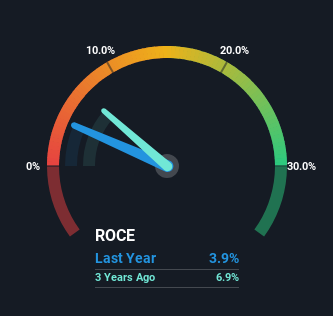- United States
- /
- Hospitality
- /
- NYSE:BROS
Dutch Bros' (NYSE:BROS) Returns On Capital Not Reflecting Well On The Business

There are a few key trends to look for if we want to identify the next multi-bagger. Typically, we'll want to notice a trend of growing return on capital employed (ROCE) and alongside that, an expanding base of capital employed. Put simply, these types of businesses are compounding machines, meaning they are continually reinvesting their earnings at ever-higher rates of return. In light of that, when we looked at Dutch Bros (NYSE:BROS) and its ROCE trend, we weren't exactly thrilled.
What Is Return On Capital Employed (ROCE)?
For those who don't know, ROCE is a measure of a company's yearly pre-tax profit (its return), relative to the capital employed in the business. The formula for this calculation on Dutch Bros is:
Return on Capital Employed = Earnings Before Interest and Tax (EBIT) ÷ (Total Assets - Current Liabilities)
0.039 = US$88m ÷ (US$2.4b - US$153m) (Based on the trailing twelve months to June 2024).
Therefore, Dutch Bros has an ROCE of 3.9%. In absolute terms, that's a low return and it also under-performs the Hospitality industry average of 11%.
See our latest analysis for Dutch Bros

Above you can see how the current ROCE for Dutch Bros compares to its prior returns on capital, but there's only so much you can tell from the past. If you'd like, you can check out the forecasts from the analysts covering Dutch Bros for free.
What The Trend Of ROCE Can Tell Us
We weren't thrilled with the trend because Dutch Bros' ROCE has reduced by 68% over the last four years, while the business employed 1,229% more capital. However, some of the increase in capital employed could be attributed to the recent capital raising that's been completed prior to their latest reporting period, so keep that in mind when looking at the ROCE decrease. The funds raised likely haven't been put to work yet so it's worth watching what happens in the future with Dutch Bros' earnings and if they change as a result from the capital raise.
On a side note, Dutch Bros has done well to pay down its current liabilities to 6.4% of total assets. So we could link some of this to the decrease in ROCE. What's more, this can reduce some aspects of risk to the business because now the company's suppliers or short-term creditors are funding less of its operations. Some would claim this reduces the business' efficiency at generating ROCE since it is now funding more of the operations with its own money.
Our Take On Dutch Bros' ROCE
While returns have fallen for Dutch Bros in recent times, we're encouraged to see that sales are growing and that the business is reinvesting in its operations. These trends don't appear to have influenced returns though, because the total return from the stock has been mostly flat over the last year. As a result, we'd recommend researching this stock further to uncover what other fundamentals of the business can show us.
One more thing, we've spotted 2 warning signs facing Dutch Bros that you might find interesting.
While Dutch Bros isn't earning the highest return, check out this free list of companies that are earning high returns on equity with solid balance sheets.
New: Manage All Your Stock Portfolios in One Place
We've created the ultimate portfolio companion for stock investors, and it's free.
• Connect an unlimited number of Portfolios and see your total in one currency
• Be alerted to new Warning Signs or Risks via email or mobile
• Track the Fair Value of your stocks
Have feedback on this article? Concerned about the content? Get in touch with us directly. Alternatively, email editorial-team (at) simplywallst.com.
This article by Simply Wall St is general in nature. We provide commentary based on historical data and analyst forecasts only using an unbiased methodology and our articles are not intended to be financial advice. It does not constitute a recommendation to buy or sell any stock, and does not take account of your objectives, or your financial situation. We aim to bring you long-term focused analysis driven by fundamental data. Note that our analysis may not factor in the latest price-sensitive company announcements or qualitative material. Simply Wall St has no position in any stocks mentioned.
About NYSE:BROS
Dutch Bros
Operates and franchises drive-thru shops in the United States.
Solid track record with excellent balance sheet.
Similar Companies
Market Insights
Community Narratives




